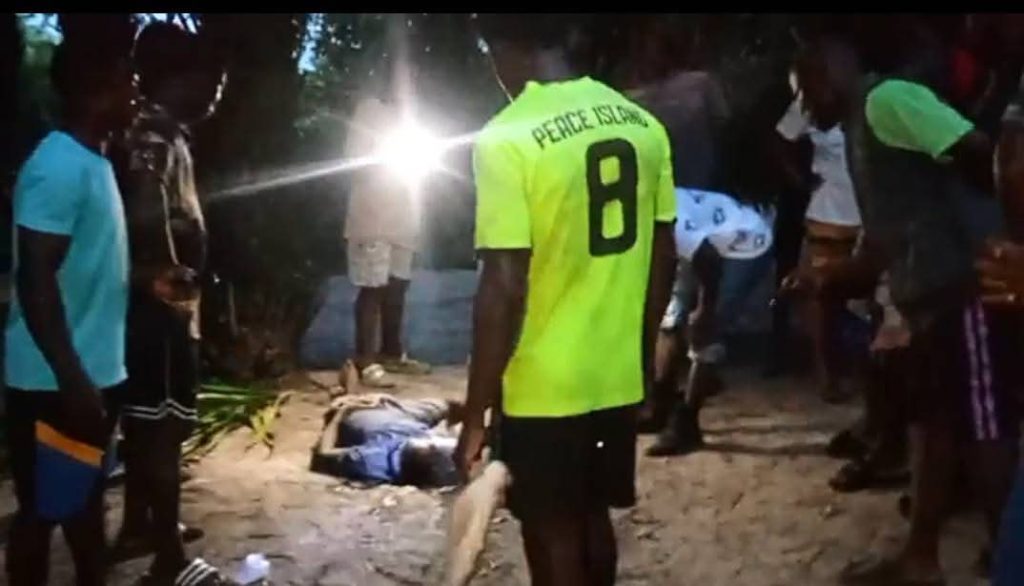The tranquility of Banjor Beach, Virginia, was shattered on Wednesday, February 12, 2025, when a police raid targeting drug users resulted in the death of a 22-year-old fisherman named Favor. The incident, which has sparked outrage and threats of retaliation within the community, unfolded as Officer Boima Massaley and other officers entered the Kongo-Gap Ghetto, a known haven for drug-related activities. Witnesses recount a chaotic scene where the sound of gunshots fired into the air by police sent individuals fleeing in panic. Amidst the chaos, Favor was fatally shot by Officer Massaley. The circumstances surrounding the shooting remain unclear, with differing accounts adding to the confusion and escalating tensions between law enforcement and the community.
The Kongo-Gap Ghetto, described as a wooded area or “gap,” became a scene of pandemonium as the police raid commenced. The sudden appearance of officers and the firing of gunshots triggered a frantic scramble for safety among those present. While the police characterized the operation as targeting drug users and facilitators, witnesses maintain that Favor was an innocent fisherman caught in the crossfire. Joseph Yourkpo, a resident, confirmed the general panic that ensued but could not provide specific details about the events leading to the shooting. Other witnesses corroborated the widespread fear and confusion, emphasizing Favor’s innocence and his occupation as a fisherman, thereby challenging the police narrative linking him to drug activities.
The incident has ignited deep-seated resentment within the community, where many view the shooting as another example of police brutality and impunity. This sentiment is fueled by allegations of past incidents involving Officer Massaley and a perceived lack of accountability for his actions. Community members, including Kollie Blama, expressed their grief and anger, questioning who would care for Favor’s family and highlighting the recurring nature of such incidents. The threats of retaliation underscore the escalating tension and the community’s demand for justice. The shooting of Favor has become a symbol of the fraught relationship between law enforcement and the marginalized community of Banjor Beach.
The Liberia National Police has launched an investigation into the shooting, and Officer Massaley has been detained pending the outcome. The investigation will be crucial in determining the precise sequence of events that led to Favor’s death and whether the use of lethal force was justified. The community’s trust in the police hinges on a transparent and thorough investigation that holds those responsible accountable. Given the existing tensions and the threat of retaliatory action, the investigation must be conducted expeditiously and with utmost impartiality to prevent further escalation of the situation.
The tragic death of Favor has brought into sharp focus the complex issues surrounding drug enforcement, police conduct, and community relations. The incident raises questions about the effectiveness of current drug control strategies and the potential for unintended consequences, especially within vulnerable communities. The Konga-Gap Ghetto, known for its drug-related activities, appears to have become a target for law enforcement operations. However, the lack of clarity surrounding the shooting and the insistence on Favor’s innocence by community members highlight the risk of collateral damage in such operations.
The path forward requires a multi-pronged approach that addresses both the immediate concerns arising from the shooting and the underlying societal issues that contribute to drug use and the marginalization of communities like Banjor Beach. Ensuring a transparent and just investigation into Favor’s death is a crucial first step in restoring community trust. However, equally important is engaging in constructive dialogue with the community to address their concerns about police conduct and to explore alternative strategies for drug control that prioritize public safety while respecting individual rights. Investing in social programs that provide opportunities for education, employment, and rehabilitation can address the root causes of drug use and promote community well-being. Only through a combination of accountability, dialogue, and proactive social initiatives can Banjor Beach begin to heal and rebuild its relationship with law enforcement.


